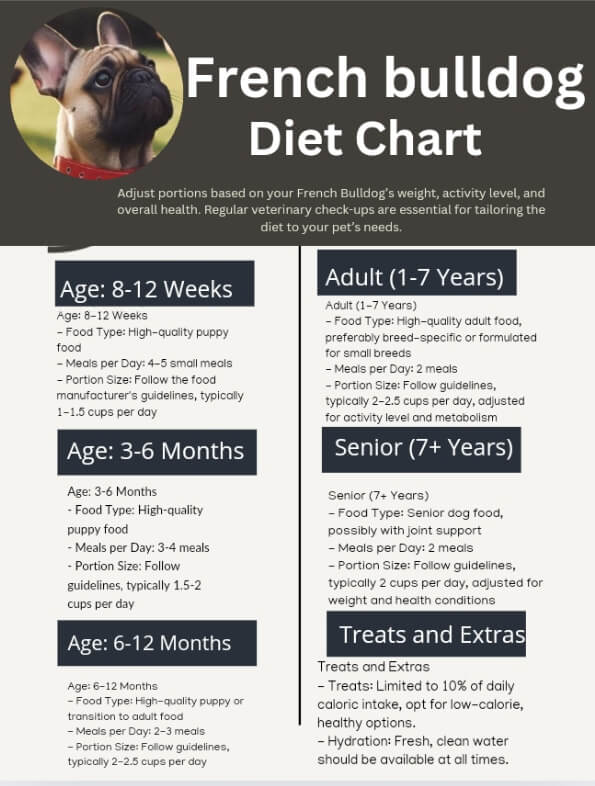French Bulldog Feeding

Hello friends, in this article today we will try to tell you how to French Bulldog Feeding so that your dog can stay entertained and free from many diseases. Friends, you are humbly requested that if you like this post, then do not forget to like and share it.

Food and nutrition play an important role in maintaining the health and fitness of your French Bulldog. To ensure that your pet continues to thrive, it is necessary to provide him with a diet according to his specific needs, such as age, size and activity level.
It is an essential step for any dog owner and trainer to pay special attention to the diet and food of their dog and increase vigilance on this subject because it is one of the most important tools through which the dog can be kept healthy, so you must know what to feed the dog and what not to feed. Your dog’s diet includes choosing high-quality dog food, managing portion sizes to prevent obesity, and establishing a consistent feeding schedule.

It is also important that you set a meal schedule for your dog and enforce it regularly because this is a process through which you are fulfilling your dog’s food requirements as well as training him mentally to eat at certain times and not to eat at other times.
Therefore, a time schedule is very important. Follow it regularly if possible. Additionally, incorporating adequate protein and healthy fats, monitoring food allergies, and ensuring proper hydration are key components of a balanced diet. You can include a variety of foods in your French Bulldog’s diet like meat, fish or pedigree foods available in the market or foods specifically formulated for dogs but regular consultation with your veterinarian can help you customize dietary choices to meet your French Bulldog’s unique health needs and support his overall vitality,
so it is important that you include a holistic line of food in your dog’s diet and provide him with a variety of food options which will lead to positive growth in the dog’s physical and mental abilities and encourage them to develop.
French Bulldog Feeding

Here is a point-by-point paragraph on French bulldog Feeding:
1. Proper diet: You should feed your French bulldog a balanced diet formulated according to their age, size, and activity level. Make sure to feed them food that is appropriate for their age. Choose a high-quality commercial dog food for your dog that meets their nutritional requirements. Look for options designed specifically for smaller breeds or consider breed-specific formulas. You can also feed your dog a food that is considered good enough for them after consulting your personal veterinarian or animal trainer.
2. Portion control: French bulldogs are often seen to be obese, so it is very important to keep a check on their food intake and avoid overfeeding them. Follow the feeding guidelines provided by the food manufacturer and adjust portions based on your dog’s individual needs, metabolism and activity level. Avoid overeating your dog. If possible, you can provide your dog with small meals multiple times a day which will have a positive effect on their health.
3. Meal Schedule: Make sure that you set a meal schedule for your dog and adjust it to your dog’s age, such as for adult French Bulldogs, establish a regular meal schedule with two to three meals a day. Keep in mind that puppies may require more frequent meals initially. Avoid overfeeding to prevent weight gain and maintain proper digestion.
4. Protein and Fat: Before feeding your dog, make sure that their diet includes enough protein for muscle maintenance and repair as they have an essential need for protein. Look for protein sources like chicken, turkey or lamb in your dog’s food. Moderate levels of healthy fats such as omega-3 and omega-6 fatty acids from sources such as fish oil promote skin and coat health. Try to feed your dog a diet that contains a high amount of protein and fat to meet their physical needs, so be especially mindful of what they eat.

5. Carbohydrates: Although dogs do not need large amounts of carbohydrates, you can add carbohydrate energy to your dog’s food from whole grains such as brown rice or oats. Avoid large amounts of filler carbohydrates and choose nutrient-rich options. Your dog will be healthier if you do this, so be careful about their diet.
6. Avoid common allergens: Some French Bulldogs may have food allergies or sensitivities. Monitor your dog for signs of intolerance, such as itching, digestive discomfort or skin problems. If you suspect allergies, consult your veterinarian and consider hypoallergenic diet options. You should also make sure that you are feeding your dog the right diet. So, consult your veterinarian from time to time and take your dog to them and follow the instructions given by the veterinarian.
7. Hydration: Make sure that your French Bulldog has access to fresh, clean water at all times. Proper hydration is essential for digestion and overall health as water is a very essential element for dogs so provide water to the dog from time to time.
8. Special Considerations: Your French Bulldog may benefit from a diet formulated to support joint health so use this type of diet, especially as he ages. Consult your veterinarian for recommendations on supplements such as glucosamine and chondroitin to support joint mobility. Feed your dog the diet as per the instructions given by the veterinarian.
9. Treats: Minimize the use of treats in your dog’s meals and choose healthy, low-calorie options. Avoid feeding table scraps or high-fat treats that can contribute to weight gain and digestive problems. If possible, feed your dog the foods recommended by your veterinarian.
10. Consult your veterinarian: Consult your veterinarian regularly and follow the instructions given by you to ensure that your French Bulldog’s diet is appropriate and meets their specific health needs. They can provide guidance on food amounts, dietary adjustments, and any concerns related to your dog’s nutrition. So it’s important to consult your veterinarian from time to time if your dog’s health and diet are not in a good condition.
By prioritizing balanced nutrition, portion control, and regular veterinary guidance, you can help ensure that your French Bulldog maintains optimal health and vitality throughout his life. So it’s vitally important to be careful about what you’re feeding your dog. Make sure you try to feed him nutritious foods in high quantities and avoid feeding him anything that could be harmful to his health.Follow all the instructions, if you do this then your dog will remain healthy and fit, that is why it is important that you feed your dog the proper diet
French bulldog feeding chart by weight and age

FAQs on French Bulldog Feeding and Nutrition
Frequently Asked Questions on French Bulldog Diet and Nutrition
1. What kind of food should I feed my French Bulldog?
– You should feed your French Bulldog a high-quality commercial dog food appropriate for his age, size, and activity level, preferably for small breeds or a breed-specific formula. You can consult a pet trainer near you to help you with your dog’s diet.
2. How much should I feed my French Bulldog?
– Follow the feeding guidelines on the dog food package before feeding your dog any recipe and adjust based on your dog’s individual needs and activity level to keep your dog healthy and energetic. You should also keep an eye on their weight to prevent dog obesity.
3. How often should I feed my French Bulldog?
– You should also pay more attention to your dog’s diet before feeding him and make sure that the food is nutritious and on time. You should feed your dog two to three times a day for adults. Puppies may need food more often, so keep these things in mind while feeding the dog. Establish a consistent feeding schedule and avoid free feeding. If possible, feed food on a fixed schedule and avoid overfeeding.
4. What nutrients are important for my French Bulldog?
– French Bulldog Feeding Make sure their diet includes enough protein for muscle maintenance, healthy fats for skin and coat health and moderate carbohydrates for energy. Look for sources like chicken, fish oil and whole grains. If available, feed them to your dog as food.
5. Can French Bulldogs have food allergies?
– Yes, they can. Keep an eye out for signs of allergies like itching or digestive issues and consult your vet if you suspect a food sensitivity. If your dog is experiencing any allergic reactions or negative effects from a food, consult your local vet if necessary.
6. How much water should my French bulldog drink?
– Make sure they have access to fresh, clean water at all times for proper hydration and overall health. French bulldogs are more sensitive to heat so make sure they don’t get dehydrated by giving them water several times a day which will help keep them healthy.
7. Should I give my French bulldog joint supplements?
– Older French bulldogs or those with joint problems may benefit from supplements like glucosamine and chondroitin. You can consult your veterinarian for advice and it is also important that you feed these foods to your dog only after consulting a professional therapist or trainer.
8. How should I administer treats to my French Bulldog?
– Use treats in moderation and choose low-calorie, healthy options that will positively enhance your dog’s health and keep the dog feeling refreshed, which will increase mental and physical ability. Avoid giving table scraps or high-fat treats that can contribute to weight gain.
9. How often should I consult my veterinarian about my French Bulldog’s diet?
– Regular consultation with your veterinarian is essential to adapt your dog’s diet to their specific health needs and make adjustments as needed and you should also regularly consult an animal trainer and make changes to the dog’s diet accordingly.
10. What should I do if I am unsure about my French Bulldog’s diet?
– If you are unsure about your dog’s diet, consult your veterinarian for personalized advice and guidance on your dog’s food intake, dietary adjustments and overall nutrition. This is an important step to keep your dog healthy and strong and energetic, so you can seek help from your veterinarian in giving your dog a diet.
Read More Related Post





